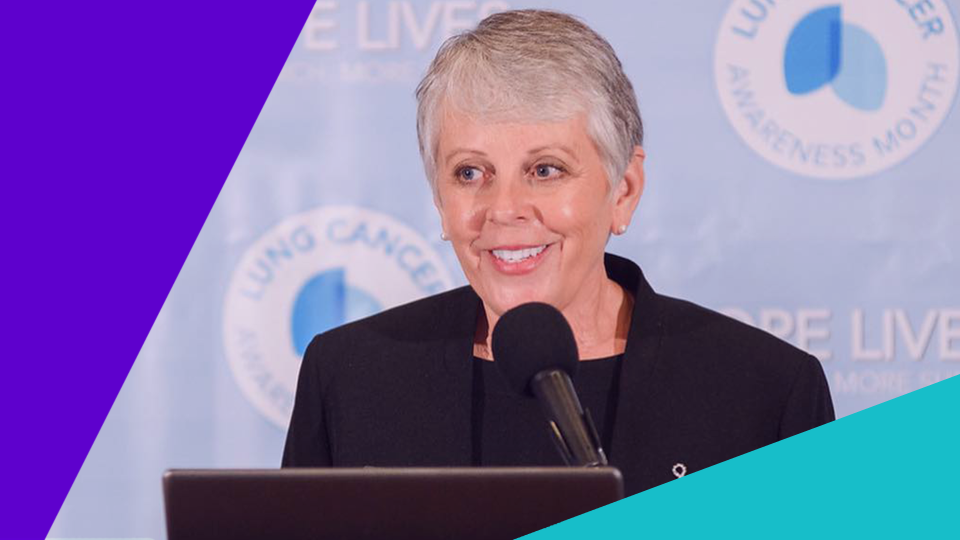'A shocking diagnosis': How this harmless symptom turned out to be cancer

Dusty Donaldson usually says she didn’t have any symptoms when she was diagnosed with lung cancer in 2005. But now, she says, hindsight is everything.
“I had a swollen gland in my neck,” she tells Yahoo Life. “It wasn’t problematic, but it kept flaring up and then calming down.” Donaldson, 66, says the swollen gland was almost imperceptible. “I couldn’t necessarily feel it with my fingertips, but I could feel tenderness in my neck,” she says. “It kept coming and going for 10 months before I mentioned it to my doctor.”
Donaldson brought up her swollen gland during her annual physical, but her doctor couldn’t detect it during an exam. “He was kind of dismissive of it,” she recalls.
But, a few weeks later, the gland was swollen again. So, she went back to her doctor, who ordered an imaging study. “The imaging was looking at my neck, but they caught a part of my lung in the imaging,” Donaldson says. Doctors saw scarring in Donaldson’s lung and thought that the swollen gland, along with a persistent tickle in her throat, may have been a result of inflammation radiating from her lung that looked like pneumonia. “I thought that was ridiculous,” Donaldson says. “I was very healthy. I hadn’t had a sniffle, cold, or anything for years.”
Donaldson’s doctor urged her to do a follow-up scan in a few weeks and that detected a potential neoplasm, an abnormal mass of cells. “That’s when I got really concerned,” Donaldson says.
She was referred to a pulmonologist, who theorized that the mass was simply scar tissue. “I don’t think you have anything to worry about,” she remembers him telling her. The doctor gave her two options: Come back in a year and have another scan, or have a biopsy. “I wasn’t concerned about cancer at that point,” Donaldson says. “But, in my personal life, I was working full-time and doing a fast-track MBA program. I was thinking that I could do the procedure and use the recovery time to catch up on studying.”
A shocking diagnosis
While Donaldson wasn’t expecting much out of the procedure, the biopsy detected stage 1 lung cancer. “I was shocked,” Donaldson says. “I am a former smoker, but I quit at age 24. I had stopped smoking for 26 years before my lung cancer diagnosis.”
Donaldson says she had a “fairly large” tumor and it was removed, along with two-thirds of her right lung. She had chemotherapy as well, “for good measure” and has been cancer-free ever since.
Facing a stigma
Donaldson says she has repeatedly faced the stigma of being a former smoker who had lung cancer. “Within an hour of being told by the pulmonologist that I had lung cancer, I returned to my university,” she says. “I shared my diagnosis with my professor and the first thing he said was, ‘Oh, did you smoke?’ It felt like a kick in the teeth.”
Donaldson says she’s heard that question “thousands of times” since her diagnosis. “Not only is it insensitive, but this stigma leads to a lack of research funding,” she says.
Donaldson says doctors don’t actually know what caused her lung cancer. “It might have been caused by smoking, but it may have been something else,” she says. While Donaldson says these questions are, “no longer offensive,” she uses them as an opportunity to educate people about lung cancer.
“Now, I say, ‘As a matter of fact, I did smoke and I quit 26 years before my diagnosis,’” she says. “No one deserves lung cancer. They deserve compassion and treatment.”
Moving forward
Now, Donaldson has her own non-profit organization, called the LiveLung, which supports the Environmental Protection Agency’s work of warning the public about the natural, radioactive gas radon. (Radon is the second leading cause of lung cancer, according to the American Cancer Society.)
“Overall, we’re trying to dispel the stigma of having lung cancer, because it does damage on every possible level,” Donaldson says.
She isn’t currently in treatment but she has scans of her lungs done once a year. “So far, everything looks good,” she says. While Donaldson says she feels good overall, she can’t breathe as well as she did in the past. “My lung capacity has been reduced by 40 percent,” she says. “But I do what I want to do.”
Read More:

